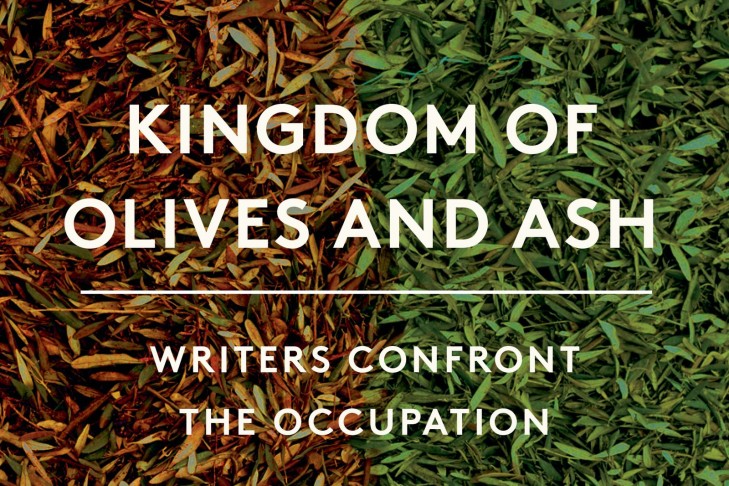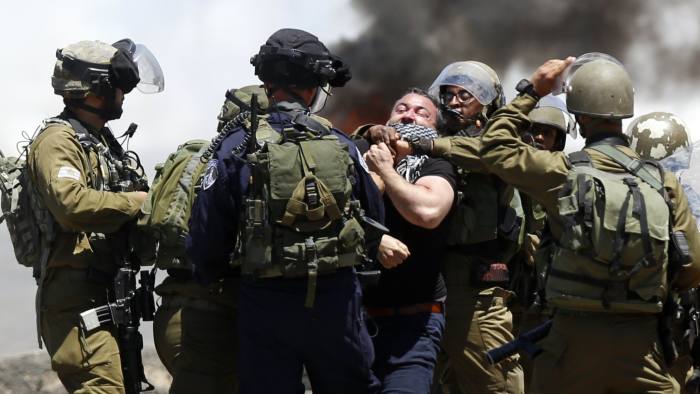Israelis may not question Occupation
Israeli soldiers arrest a Palestinian during a protest in the West Bank in support of the hunger strike by Palestinian prisoners. Israel is preparing to mark the 50th anniversary of the six-day war in which it seized Palestinian lands. Photo by EPA
Israelis draw flak for criticising occupation of Palestinian land
Rights activists denounced as traitors for not celebrating legacy of six-day war
By John Reed in Jerusalem, Financial Times
June 01, 2017
As Ami Ayalon, an Israeli war hero, spoke in critical terms about Israel’s occupation of Palestinian lands, a heckler with a megaphone screamed “traitors!” and hurled other insults.
Israeli leftists had been listening rapt as the decorated former head of the Shin Bet security service voiced support for Breaking the Silence, an organisation of serving and former soldiers that exposes human rights abuses against Palestinians.
“It’s not only bravery on the battlefield, it’s bravery to speak your mind,” Mr Ayalon told a panel discussion at Jerusalem’s Barbur Gallery. He went on to warn of what he described as “creeping totalitarianism” in the Israel Defence Forces. “We know the IDF is a moral army, but an occupying army cannot be moral.”
The mood in the art gallery in April contrasted sharply with the largely triumphalist tone in Israel ahead of preparations to celebrate the 50th anniversary of the 1967 six-day war next week. During the conflict, Israel captured the West Bank, East Jerusalem and the Gaza Strip, beginning what has become the world’s longest continuing military occupation.
Half a century on and with the peace process moribund, few Israelis even use the word “occupation”. The rare voices of domestic criticism come mainly from left-leaning media and NGOs such as Breaking the Silence that argue that ending the occupation and creating a Palestinian state is crucial to resolving the conflict.
However, the NGOs are coming under increasing pressure from Benjamin Netanyahu’s rightwing government. It is openly hostile and has taken steps to shame, isolate and punish them.
Ami Ayalon, an Israeli war hero, accuses the government of using fear tactics and stifling discussion of the occupation .
Last year, the administration passed a law requiring NGOs to disclose the funding they receive from foreign governments, a move condemned by the EU and denounced by activists as anti-democratic.

Edited by by Michael Chabon and Ayelet Waldman, published by HarperCollins, May 2017.
“The current administration — the longest-serving prime minister in Israeli history — not only doesn’t encourage dissent, it seems hell-bent on silencing voices of reason and experience,” says Ayelet Waldman, a US writer who co-edited Kingdom of Olives and Ash, a book of essays on the occupation published this week, with the support of Breaking the Silence.
Breaking the Silence has been the most conspicuous target of the government’s ire. Rightwing Israeli critics accuse it of smearing the IDF, the country’s most respected institution, and airing Israel’s dirty linen abroad.
Mr Netanyahu provoked a rare diplomatic spat with Germany in April when he cancelled a meeting with Sigmar Gabriel. The German foreign minister had defied the Israeli leader’s ultimatum not to meet Breaking the Silence and other NGOs.
On Monday, the prime minister told MPs from his Likud party he would not meet foreign leaders who meet organisations “working against Israeli soldiers”, Ha’aretz newspaper reported.
Mr Netanyahu’s criticism of NGOs comes in the wake of the election of President Donald Trump, who has questioned longstanding US policies on issues such as settlements in the occupied territories. Mr Trump is expected to make a politically sensitive decision on whether to move the US embassy to Jerusalem, as he promised Israelis he would, or sign a waiver postponing it, as past presidents have, by Thursday.
Breaking the Silence says it has faced threats, cyber attacks and other forms of harassment. Naftali Bennett, the education minister, has tried to bar the group from speaking at schools.
However, criticism from former top security officials such as Mr Ayalon packs a potent punch in Israel because it is harder for right-wingers to dismiss them as unpatriotic and uninformed. Speakers at the Barbur Gallery event, called “Gatekeepers Breaking their Silence”, also included Carmi Gillon, another former Shin Bet director, and Alik Ron, a former senior police commander.
“Not many Israelis can see ourselves [what we look like] from the outside,” Mr Ayalon said in an interview after the event. “This is something that most of us lack. Too many friends are dying, and in the political environment they [the government] manipulate our fear.”
Mr Ayalon, 71, was awarded the Medal of Valour, Israel’s highest military honour, for his role in an assault in 1969 on Green Island, an Egyptian military fortress at the southern tip of the Suez Canal. He sustained multiple wounds during the operation, was evacuated by boat and had to inject himself with morphine.
As a civilian he became a peace activist, running as an MP. He unsuccessfully contested the leadership in 2007 of what was then the Labour party.
In the decade since, Israel’s peace camp has diminished in the political landscape and among the general public. While most Israelis say they support a two-state solution, many are sceptical about the chances of achieving it, particularly after Israel fought three wars with Hamas, the militant group that controls the Gaza Strip, and following a wave of Palestinian violence in Israel and the West Bank.
“The occupation is so normalised that it’s no longer a topic, nor an issue in the public political sphere,” says Yehuda Shaul, an activist with Breaking the Silence.
The mood is reflected in the language Israelis use to describe their protracted conflict with the Palestinians.
Outside leftwing circles, Israelis more typically speak about “the situation” when discussing the conflict than the “occupation”. The director of Army Radio recently ordered his journalists to stop using the term West Bank, describing it as a Palestinian expression. They should use “the territories” instead.
“Those who understand the moral aspect of the occupation are a small minority,” said Mr Ayalon. “Most Israelis don’t want to stay in the territories, but most don’t want to believe we can get out.”

